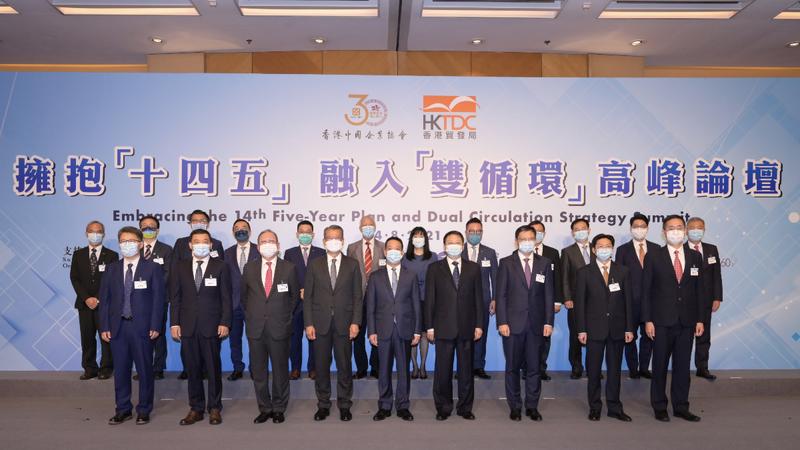 Hong Kong Financial Secretary Paul Chan Mo-po (front row, fourth left) poses for photos with delegates at the “Embracing the 14th Five-Year Plan and Dual Circulation Strategy Summit” in Hong Kong on Aug 24, 2021. (PHOTO / INFORMATION SERVICES DEPARTMENT, HKSAR GOVT)
Hong Kong Financial Secretary Paul Chan Mo-po (front row, fourth left) poses for photos with delegates at the “Embracing the 14th Five-Year Plan and Dual Circulation Strategy Summit” in Hong Kong on Aug 24, 2021. (PHOTO / INFORMATION SERVICES DEPARTMENT, HKSAR GOVT)
Hong Kong’s young people are expected to get in sync with the national development plan in order to unlock their potential and carve out a bright future, city leaders said on Tuesday.
Henry Ho Kin-chung, founder and chairman of the One Country Two Systems Youth Forum, said young people in Hong Kong have every reason to align their dreams and career plans with the nation’s grand 14th Five-Year Plan (2021-25), since favorable policies and opportunities for them are legion in the Guangdong-Hong Kong-Macao Greater Bay Area.
The Greater Bay Area provides a fertile ground for Hong Kong young people to sow the seeds of innovation and entrepreneurship
Henry Ho Kin-chung
founder and chairman of the One Country Two Systems Youth Forum
Speaking on the sidelines of the Embracing the 14th Five-Year Plan and Dual Circulation Strategy Summit, Ho said the Greater Bay Area provides a fertile ground for Hong Kong young people to sow the seeds of innovation and entrepreneurship.
Hong Kong has its own deep-seated issues, such as high land prices and expensive rentals, which will be difficult to overcome overnight, but they can be overcome through integration and collaboration with nearby cities in Guangdong province, he said.
ALSO READ: Hong Kong has key role to play in nation’s 14th Five-Year Plan
“Our think tank has an office in the Guangdong Higher Education Mega Center. We’ve seen a wealth of favorable policies there to support Hong Kong young people pursuing their dreams, including a variety of subsidy programs, training programs for entrepreneurship, venture capital, etc.,” Ho said.
For those who don’t intend to follow an entrepreneurial path, the national development plan as well as the Greater Bay Area have promised upbeat career prospects for these Hong Kong young people as well, he said.
“I know that there are some places in Guangdong offering civil service openings for Hong Kong young people. This is a very good chance for our young adults to know what our government is doing and a rare experience that will influence them throughout life,” he said. “Even if they leave the civil service field after a few years, that (experience) will still be an asset for them to further their careers, whether on the Chinese mainland or in Hong Kong.”
Hong Kong young people’s involvement into the national development is of paramount importance to complement the strengths of both sides — the scientific innovation of Hong Kong universities, and the manufacturing capacity and sizable market on the mainland, Ho said.
Acknowledging that the mainland has extended open arms to Hong Kong’s young professionals with appealing policies and a complementary infrastructure, Yuen Mo, chairman of the Chinese General Chamber of Commerce, said that Hong Kong is ahead of the curve in many aspects, particularly drone research and innovation, and astronomical science, in which the Polytechnic University of Hong Kong specializes.
READ MORE: HK scientists urged to take part in nation's tech projects
While the “dual circulation” economic strategy initiated by the central government as a part of the Five-Year Plan places an emphasis on the domestic market as a countermeasure to rising trade protectionism and the unstable global economic status quo, this doesn’t mean the country will forsake its opportunities in external markets, Yuen said. Indeed, President Xi Jinping reiterated on many occasions that China will not completely close itself off from the outside world, but open up more, he said.
The “dual circulation” strategy as well as the Greater Bay Area development road map consolidates Hong Kong’s irreplaceable and unique role, Yuen added.
Hailing the planned economy that China has adopted as an ingenious and thought-out resolution, Sunny Ho, executive director of the Hong Kong Shippers’ Council, argued that Hong Kong young people should do away with their outdated prejudices against a planned economy. He recalled that when he studied economics at the University of Hong Kong in the 1980s, many local classmates questioned the feasibility of a planned economy. They thought that an elaborately hammered-out plan was prone to wrong judgments and lapses, dismissing it as lackluster and conservative, he said.
“Our country’s success story over the past decades has signaled the planned economy is tried and true,” Sunny Ho said.
The five-year plan is a farsighted approach, making every developmental stage straightforward with explicit objectives, said Sunny Ho. “Our young people should plan their future in the same vein. They should take a long-term view to curate their future blow by blow.”


